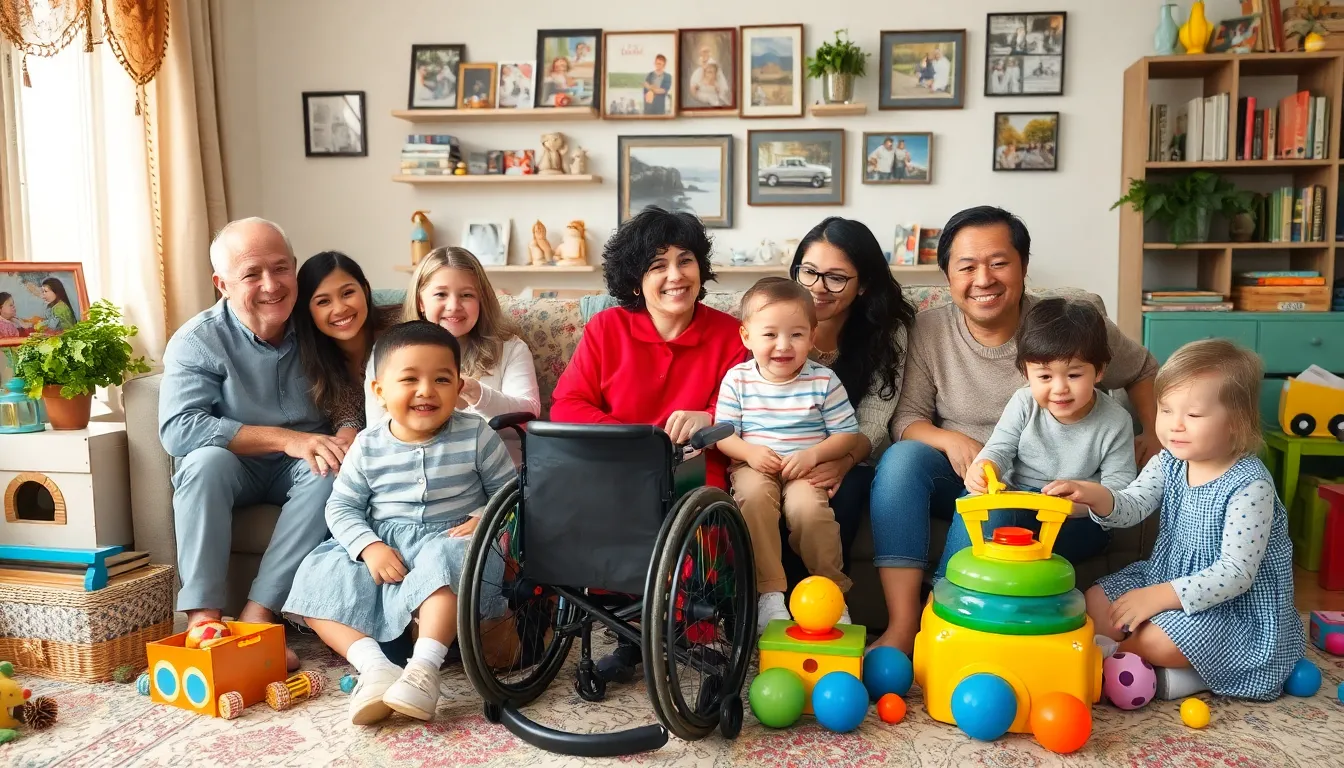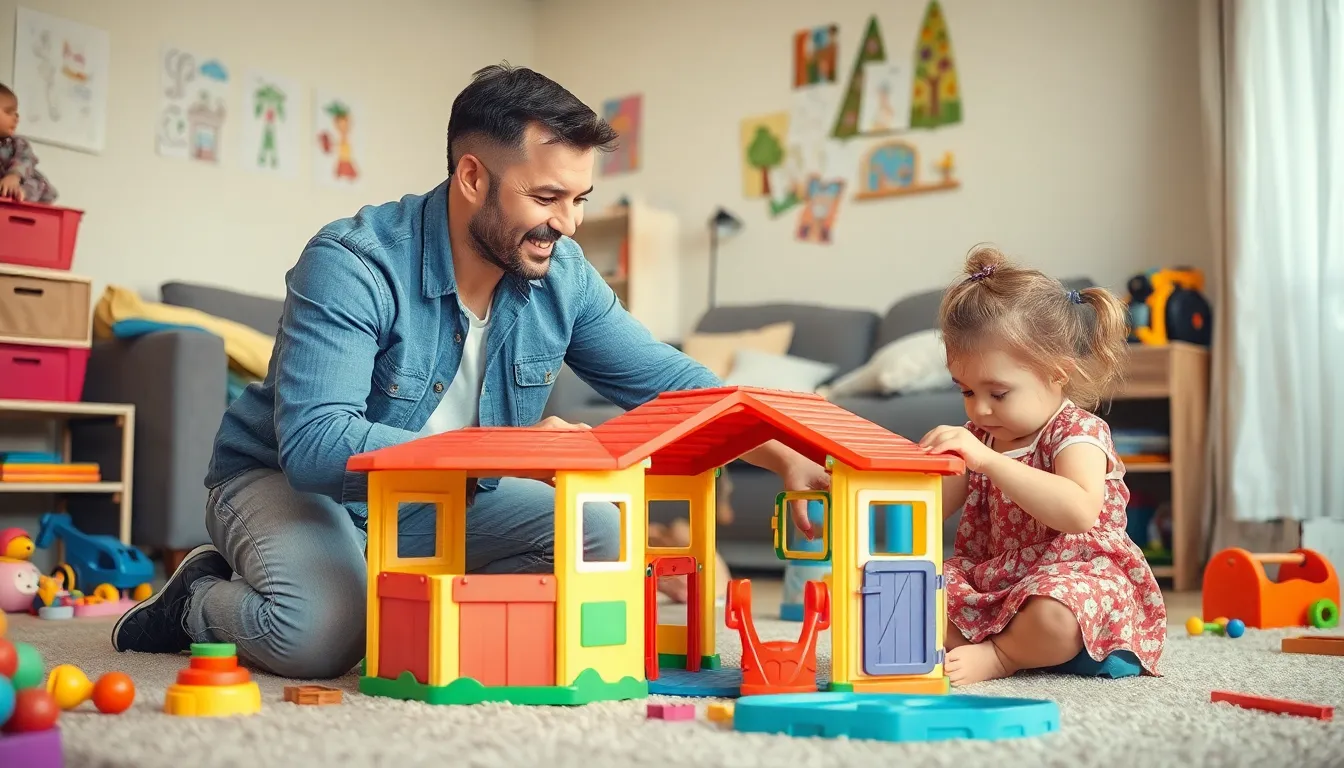Adopting a child is one of life’s most rewarding adventures, but special needs adoption takes that journey to a whole new level. Imagine opening your heart and home to a child who might just teach you more about love, resilience, and joy than you ever thought possible. Sure, it comes with its own set of challenges, but let’s be honest—who doesn’t love a good plot twist?
Special needs adoption isn’t just about giving a child a forever family; it’s about embracing the beautiful chaos that comes with it. From navigating the world of therapies to celebrating every small victory, this journey is filled with moments that’ll make you laugh, cry, and ultimately appreciate life in ways you never expected. So, buckle up and get ready for an experience that’s as fulfilling as it is unpredictable—because every child deserves a chance, and you just might be the superhero they’ve been waiting for.
Table of Contents
ToggleOverview Of Special Needs Adoption
Special needs adoption refers to the process of adopting children with physical, emotional, or developmental challenges. Many organizations define special needs based on various factors, including age, race, and medical conditions. Each situation presents unique requirements and support options for adoptive families.
Adoptive families often face a range of emotional and logistical considerations during the adoption process. These families may need to prepare for therapies and specialized medical care. Some children might experience trauma, requiring additional patience and understanding.
Financial assistance programs exist to support families adopting children with special needs. Grants, subsidies, and tax credits may alleviate the costs associated with adoption and ongoing care. Many states allocate funds to help cover medical expenses and therapy services.
Support networks play a crucial role in the journey of special needs adoption. Community organizations provide resources, advocacy, and emotional support for adoptive families. Peer groups connect families facing similar challenges, fostering friendships that can enhance the parenting experience.
Adoptive parents often report profound personal growth from their interactions with special needs children. Resilience, empathy, and adaptability develop over time, as families learn to navigate the complexities of their unique situations. Special needs adoption serves not only to provide children with loving homes but also enriches the lives of the adopters themselves.
Ultimately, special needs adoption embodies a commitment to unconditional love. Each child deserves a nurturing environment where they can thrive. Adopting a child with special needs cultivates a bond that can last a lifetime, filled with shared challenges and joyful achievements.
Types Of Special Needs

Adopting children with special needs includes various categories. Each type presents unique requirements and challenges for adoptive families.
Physical Disabilities
Physical disabilities encompass a wide range of conditions affecting mobility and bodily functions. Conditions like cerebral palsy, spina bifida, and muscular dystrophy significantly impact daily activities. Adopting a child with a physical disability often means providing specialized medical care and accessibility modifications at home. Supportive therapies, including physical and occupational therapy, play crucial roles in enhancing the child’s quality of life. Families may also need to navigate public services and resources that cater to these specific needs, ensuring the child can thrive both physically and emotionally.
Cognitive Impairments
Cognitive impairments affect a child’s ability to learn and process information. Conditions such as Down syndrome, intellectual disabilities, and autism spectrum disorders exemplify this category. Each child manifests unique strengths and challenges regarding learning and social interaction. Adoptive parents often engage in tailored educational plans and behavioral therapies to support their child’s development. Collaboration with specialists, such as educators and therapists, creates a robust support network, enhancing the child’s ability to achieve personal milestones and social skills.
Emotional and Behavioral Challenges
Emotional and behavioral challenges encompass disorders like ADHD, anxiety, and attachment disorders. These conditions can stem from trauma or genetic factors, creating various needs in adoptive families. Addressing these challenges typically involves a combination of counseling, therapy, and behavioral interventions. Adoptive parents often cultivate strong communication and emotional support systems to foster secure relationships. Building trust and stability becomes essential, as these children may have experienced instability in their past, requiring patience and understanding to flourish in a loving environment.
The Adoption Process
The adoption process for special needs often involves several key steps. Prospective parents must prepare thoroughly before embarking on this journey.
Preparing To Adopt
Preparation involves research, attending training sessions, and developing a support network. Organizations supporting special needs adoption provide resources for prospective parents. Home studies evaluate families’ readiness, ensuring they can meet a child’s unique needs. Additionally, understanding relevant therapies and child-specific requirements plays a crucial role in preparation. Communicating openly within families helps everyone align their expectations and fosters stability.
Matching With A Child
Matching with a child requires careful consideration of compatibility. Agencies assess individual preferences, family dynamics, and the specific needs of children. Reviewing profiles of children awaiting adoption helps establish priorities. Not all children fit every family; certain attributes, like medical conditions, temperament, and developmental considerations, guide the matching process. The goal is to create a positive environment for both the child and the family, promoting lasting connections.
Legal Considerations
Legal considerations involve understanding adoption laws and regulations. Adoptive parents should familiarize themselves with the legal processes in their state. Filing necessary paperwork can include consent forms, background checks, and home evaluations. Attending court hearings is often required to finalize adoption. Working with experienced attorneys ensures families navigate the legal landscape efficiently. Adhering to all legal guidelines protects the rights of both the child and the adoptive parents.
Resources And Support
Access to resources and support is crucial for families considering special needs adoption. Various organizations and financial programs provide essential assistance.
Community Organizations
Numerous community organizations offer support tailored to families with adopted children who have special needs. These groups often provide educational resources, host workshops, and facilitate support groups for adoptive parents. Engaging with local chapters of national organizations can foster connections with other families who share similar experiences. Some examples include the National Adoption Center and the Special Needs Adoption Network, which offer comprehensive guidance and resources. Connecting with these organizations creates a sense of community and belonging.
Financial Assistance
Financial assistance plays a vital role in making special needs adoption more accessible. Many programs offer grants, subsidies, and tax credits to help cover adoption costs and ongoing expenses related to care. For instance, The Adoption Tax Credit can provide significant financial relief to adoptive parents. Additionally, organizations like Gift of Adoption Fund offer grants that help finalize adoptions for children with special needs. Understanding these financial resources enables families to navigate potential costs more effectively and focus on parenting.
Challenges And Rewards
Special needs adoption presents distinct challenges and profound rewards for adoptive families. Navigating the complexities of this journey requires commitment and compassion.
Challenges In Special Needs Adoption
Adopting a child with special needs involves many challenges that families must address. Understanding medical conditions and therapies can overwhelm even the most prepared parents. Emotional and behavioral issues may arise from past traumas, demanding patience and effective communication from caregivers. Financial burdens often emerge due to ongoing therapy and medical care costs, necessitating careful budgeting. Legal hurdles also complicate the process, as parents must navigate state-specific adoption laws and regulations. Each child’s unique needs require tailored educational plans and significant advocacy within school systems. Families often seek support from community organizations, yet building an effective support network takes time and effort.
The Rewards Of Adopting Special Needs Children
Adopting special needs children offers incredible rewards that enrich the lives of entire families. Watching a child overcome obstacles fosters deep connection and unconditional love. Each small achievement, whether it be a first word or a successful social interaction, brings immense joy to both the child and their parents. Personal growth becomes evident as caregivers develop resilience and empathy through their experiences. Families form strong bonds that are often characterized by mutual support and understanding of each other’s challenges. The transformative impact on the child, flourishing in a nurturing environment, creates lasting happiness for parents. Engaging with other adoptive families through shared experiences enhances community connections and support networks.
Special needs adoption represents a unique journey filled with both challenges and profound rewards. Families who embrace this path discover the transformative power of love and resilience. Each child’s story is different, and the commitment to nurturing their potential fosters deep connections and personal growth for adoptive parents.
By understanding the complexities and seeking out resources, families can create supportive environments where children thrive. The journey may not always be easy, but the joy of witnessing a child’s progress and celebrating their victories is unparalleled. Ultimately, special needs adoption enriches lives, proving that every child deserves a loving home and the opportunity to flourish.







